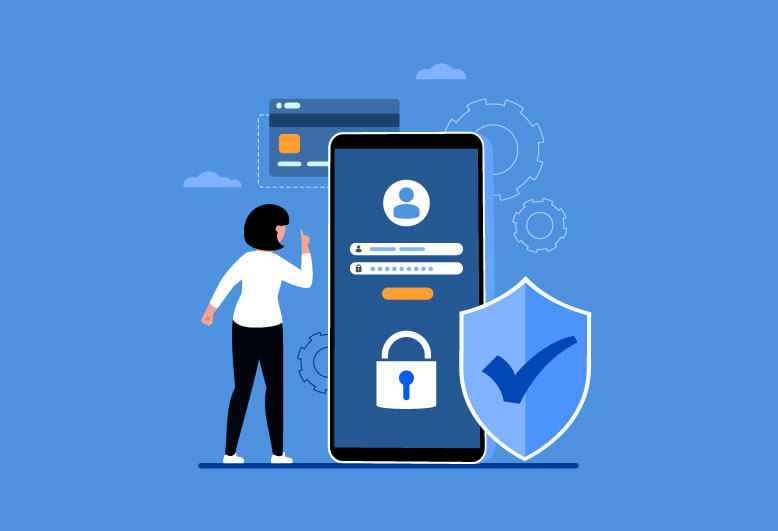All around the world, cybersecurity incidents are on the rise. If a determined hacker really wants to access your network, they can probably do so. But not all fraudsters are that talented or committed. If you adopt even just one of the following 10 habits, you may be able to significantly reduce the chance of being among the victims of cybercrime and can vastly improve your online privacy.
1. Identify phishing attempts
Phishing refers to the practice of attempting to get personally identifiable information from unsuspecting victims in order to commit fraud. The fraud typically takes the form of identity theft or fraudulent transactions. These attacks can be particularly harmful and they have doubled since 2020.
Fraudsters tend to pose as a reputable business, sometimes using business names that are very similar to actual companies. They may then offer a bogus investment opportunity or demand that you provide further details, such as your bank account details or address, to collect a parcel or access a prize that doesn’t really exist.
Fortunately, you can learn to spot phishing attempts. Look out for:
- Poor spelling and grammar.
- Misspelled business names.
- Website addresses that contain fake names or do not look official.
- An over-emphasis on urgency and deadlines.
If you think you have received a phishing attempt, report it or mark it as spam. If you’re unsure, use Nuwber’s database to verify or disprove the sender’s details.
2. Install a firewall and virus checker
To protect your device and your privacy, make sure you have a firewall and virus checker installed. A firewall monitors everything coming in and everything going out. A virus checker examines files to ensure they are not harmful and deals with them accordingly if they are.
Most devices come with these kinds of software installed. Sometimes, users need to activate them. Set your virus checker to run regularly to keep your software, hardware, and data protected.
Free versions can be effective but paying for the software can afford you enhanced protection. Also beware that some websites propose free virus software solutions in an attempt to spread malware and profit from a steady influx of vulnerable users. Check out their business names and look for reviews on independent websites to verify they are the real thing.
3. Keep your software up to date
Software developers release software updates to improve performance and fix bugs. They also provide updates that fix vulnerabilities that hackers and scammers could exploit.
Hackers can use a security issue in an app to access a device and gather personally identifiable information with which to access an account fraudulently or create new accounts.
The solution is to keep all your apps and other software up to date to prevent unauthorized access to your confidential data. When your operating system suggests that you perform a scheduled upgrade, it may be inconvenient, but don’t wait too long before clicking yes.
4. Use a Virtual Private Network (VPN)
Criminals enjoy using VPNs because they mask their identities and activities online. You can do the same legally to protect yourself from those criminals, as well as marketers, government agencies, and more.
VPNs vary in quality. And their speeds and capabilities also vary. So check out several options to find the one that works best for you. Don’t be afraid to spend some money on a more reliable, faster service.
5. Use strong passwords
Password-protecting your devices and apps is an excellent way to add a layer of protection to your online privacy. It can slow things down for you, but it can also slow down or stop an attempt to access your data.
A strong password is a nonsensical (or seemingly nonsensical) combination of letters, numbers, and symbols. Avoid things that are easy to guess or discover, such as names, birthdays, consecutive numbers, and favorite sports teams.
6. Change your passwords regularly
Changing your passwords regularly can enhance your online privacy because you don’t necessarily know when one of your accounts has been infiltrated.
Criminals may make small, less noticeable fraudulent transactions to begin their campaign. A hacker in your email account might not make any changes in order to keep their access hidden from you.
Updating your password every few months, therefore, can help you lock out a fraudster who already has access to your email or app.
A further note on passwords: if you can bear it, it’s a good idea to use different passwords for all your logins. Considering the potential threat of a criminal gaining access to your data, it is most secure to use and maintain an entirely different password for every app and service you use. Doing so can seriously improve your online privacy. And you can monitor your many logins and passwords using a secure password manager.
7. Avoid public WiFi
Public WiFi, such as the WiFi people can log onto at cafés and airports, has little to no security. This makes it easily accessible to customers but also to fraudsters. Without the security offered by a passworded, private network, your activity, communications, and transactions may be visible to everyone.
8. Don’t leave your device unattended
Preventing physical access to your devices can prevent people from accessing your apps, email, and other services. It wouldn’t take long for a hacker to acquire personal information with which to commit fraud or facilitate further access to your device or network.
Keeping your devices with you is also excellent for helping prevent someone from stealing them entirely, so this is a particularly good tip! Don’t think that an old laptop or a damaged phone are not targets. If your device is stolen, the perpetrator may be more interested in using your data to commit fraud than the device itself.
9. Log out
Without logging out, you risk allowing someone to use your apps as if they were you. Not logging out is like leaving a house without closing the door behind you.
Even if you’ve navigated away from a page, you can remain logged in. With some websites, it is occasionally possible to use the back button to return to a logged-in status. This is bad for online privacy.
Some sites ask if you would like to remain logged in all the time. If you’re using a personal computer that you don’t share with others, this can be very convenient, rather than having to enter your username and password every time. For enhanced security and improved online privacy, however, avoid the option to stay logged in. And never do it on a shared or public computer.
10. Use your instincts
Whichever habits you adopt or hone, using your instincts can help you spot scams and protect your identity online. If you suspect a communication may be a scam, verify the identity of the sender or delete it.
If you suspect that someone may have accessed your email or another app, run a virus scan and consider changing your passwords.
The threat is increasing from criminals who can profit from access to our devices. Adopting one of these everyday habits can help protect you from crimes that can be anything from inconvenient to devastating. Learn to follow all 10 tips to be much more secure online and massively improve your valuable online priv

“Beer practitioner. Pop culture maven. Problem solver. Proud social media geek. Total coffee enthusiast. Hipster-friendly tv fan. Creator.”





